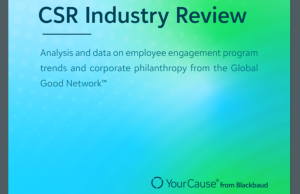5 challenges nonprofit leaders will face in 2020 and beyond
Millennials are now in a position to take over the reins of many of our most important and cherished nonprofit organizations, and Generation Zers are close behind. As technology and digital natives, these new generations are savvier, more diverse, more committed and more challenged than their Baby Boomer and Generation X elders.
While the critical global issues that their organizations serve and fight against remain complex and demanding, the next generation of nonprofit leaders will also face institutional issues that will require business acumen and management skills often ignored or dismissed by their founders and senior leaders. In particular, the next generation of nonprofit leaders will need to have their voices heard on many contemporary organizational issues, including the following five challenges that might hit close to their places of work:

Diversity, equity and inclusion.
While for-profit companies have focused a tremendous amount of attention on diversifying their teams over the years, their nonprofit counterparts often lag behind in being as inclusive and equitable. Corporations have been required or encouraged by regulators and stakeholders to reveal their performance on gender pay equity and diversifying their governing bodies. Nonprofits are under no such obligation, and many remain non-representative of their local communities and constituencies. Expect to see more attention paid to transparency on these issues-as funders and activists force some laggards into the limelight, and younger leaders refuse to accept the status quo.
Income inequality.
It’s been reported that the 26 richest people in the world now have as much wealth as the poorest 3.8 billion people. Some elected leaders have their own plans to help mitigate these inequities, but nonprofit leaders need to be especially sensitive to how they either contribute to, or fight against, this phenomenon. Expect to see more attention paid to living wages for nonprofit workers in entry-level and junior roles, and more media scrutiny of nonprofit CEO compensation.
Nonprofits taking stands.
According to a 2017 Cone Communications study, 67 percent of Americans believe progress on social and environmental issues will be slowed in the absence of government regulation, but 63 percent of Americans are hopeful that businesses will take the lead in driving critical social and environmental change.
While it’s heartening that companies are taking up the mantle dropped by government, nonprofits can and should be playing a critical role in leading on these issues. Yet, their leadership is often muted by fundraising concerns and risk-adverse boards of directors at just the time that they are needed the most. Expect to see younger leaders filling the vacuum and speaking out on issues that their elders have been reluctant to be vocal about.
Environmental sustainability.
While leaders at many nonprofit organizations have taken public positions on issues of environmental responsibility, their organizational track records in cutting carbon footprints and waste often lack transparency and reportable results. Many nonprofit leaders regularly travel to destinations for face-to-face encounters when telepresence meetings would do just fine, and many continue to send a significant amount of direct mail.
Expect to see younger leaders embrace more sustainable business practices for their own organizations, including less and more eco-friendly travel, fewer ineffective mailings and print publications, more composting, less use of single-use plastic, and more efficient use of energy.
Cybersecurity.
Many nonprofits are ill-equipped to guard the privacy of their staffs, donors and clients against hacking and cyber-terrorism. The number of organizations held hostage by cyber-criminals continues to increase yearly, and many nonprofits are increasingly vulnerable to malware, phishing and cyber-attacks of all stripes. While there have only been a few well-publicized instances of substantial data breaches at nonprofits, it’s only a matter of time before another one becomes the next high-profile victim. Expect to see younger leaders pay more attention to upgrading their technology platforms and installing security systems to guard their private information.
The list of global challenges will be long, and the solutions to these problems will be difficult and complex. The next generation of nonprofit leaders will need to focus their talents on both meeting these global challenges and creating business models that allow their organizations to be diverse, equitable, sustainable, protective and inclusive. These are not easy tasks, and the road to a sustained future will require more attention (and resources) devoted to leadership and business skills development, ethics, accountability, interpersonal relations and personnel management.
At American Express, we have been committed to developing and training the next generation of nonprofit leaders around the world for the past 13 years. In this time, we have helped train more than 5,000 young leaders from greater than 50 countries through our American Express Leadership Academy, and an additional 100,000 leaders in other face-to-face and online programs in over 100 countries.
Our reasons for doing so are varied, but they include the objective of keeping young leaders in the sector and helping them to advance in their organizations and causes. According to our research, more than 90 percent of leaders who have been trained by our Leadership Academy programs are still employed in the social sector, and over 70 percent have been promoted in their organizations or have taken on additional responsibilities since attending Leadership Academy programs.
If the next generation of nonprofit leaders can better prepare for their external and internal challenges, they will have advanced the global social sector in lasting and tangible ways.
Timothy J. McClimon is senior vice president of corporate social responsibility at American Express. His email is [email protected]











